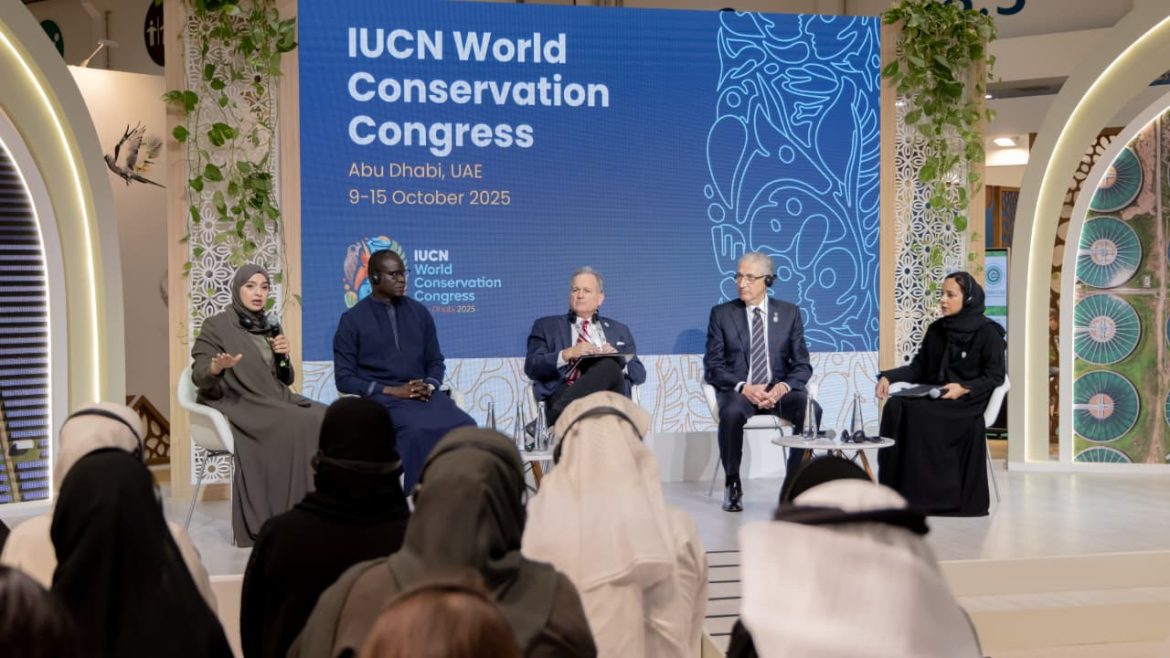The second day of the IUCN World Conservation Congress 2025 shifted the focus from ambition to action, mobilising business leadership for nature, advancing integrated delivery of the SDGs, and championing community-driven conservation. Hosted by the United Arab Emirates and co-organised by the Ministry of Climate Change and Environment (MOCCAE) and the Environment Agency – Abu Dhabi (EAD), the Congress, which runs from 9 to 15 October, welcomes more than 10,000 delegates across its Members’ Assembly, Forum and Exhibition.
At the heart of the Congress venue, the UAE Pavilion continued to serve as a dynamic platform for knowledge exchange and partnership building, reflecting the nation’s enduring bond with nature. Day Two programming spotlighted the UAE’s cross-sector innovation in climate adaptation, freshwater resilience, and marine biodiversity. Sessions such as Nature Without Borders: Bridging the UAE and Asia-Pacific for Climate and Disaster Resilience, attended by HE Mohammed Ahmed Al Bowardi, Vice Chairman of EAD Board of Directors and Chairman of EAD’s Executive Committee, highlighted the Building Climate Resilient Programme, a bold new regional initiative incubated in the UAE by Emirates Nature–WWF and leading Asia-Pacific experts.
The launch of the World Bank report ‘Continental Drying: A Threat to Our Common Future’, hosted by the Ministry of Foreign Affairs (MOFA), underscored the UAE’s convening power in connecting regions facing similar environmental challenges.
Among the day’s most engaging sessions, Thriving Against the Odds: Marine Megafauna Conservation in Extreme Environments highlighted EAD’s leadership in monitoring and protecting key species such as dugongs, sea snakes, sea turtles and cetaceans in Abu Dhabi’s coastal waters—ecosystems uniquely challenged by high salinity, temperature and eutrophication. The session also explored rescue and rehabilitation programmes for marine species and the restoration of seagrass meadows, a vital food source for dugongs. Later in the evening, Designing Resilient Cities: Integrating Nature, People and Innovation and Framing the Global Freshwater Challenge for Arid and Water-Scarce Regions emphasised the UAE’s holistic approach to sustainability—bridging urban design, data-driven conservation and environmental governance to advance resilient futures for both people and planet.
The UAE’s participation at the Congress underscores its leadership in global conservation diplomacy. Emirati experts, youth delegates, and partner organisations are engaging in sessions on climate-resilient ecosystems, marine protection, and biodiversity financing. Led by MOCCAE and the EAD, the host nation is showcasing national achievements such as milestone restoration projects, advances in blue-carbon research, and the rewilding of iconic desert species. The EAD also hosted a youth session titled the invisible thread: ‘Mentorship and collaboration across generations’, featuring Sheikha Osha Bint Mohamed Al Nahyan, young inventor and International Greenwich Olympiad winner.
Together, these efforts demonstrate how the UAE links ecological restoration with economic opportunity and invites the world to unite with nature for the wellbeing of all life.
A highlight of the day was the opening of the IUCN Business Summit at ADNEC, which brought together CEOs and senior business leaders to embed nature in corporate decision-making and accelerate investment in nature-positive economies. Day Two also marked the culmination of the three-day World Summit of Indigenous Peoples and Nature, recognising the central role of Indigenous leadership and traditional knowledge in achieving global conservation outcomes.
In the afternoon, a high-level Nature, Climate and People Nexus Panel, led by the UAE Global SDG Council and chaired by representatives of four interconnected SDGs, explored actionable pathways linking freshwater, marine, terrestrial and climate priorities. Co-sponsored by the UAE SDG Secretariat and EAD, the session underscored how integrated governance is essential to achieving real-world progress toward the 2030 targets.
Forum plenaries explored how equity, innovation and financing can shape a resilient, nature-positive future, while sessions across the Learning Zones highlighted advances in green finance, restoration technology and inclusive conservation leadership.
Youth leadership was another thread of the day, with sessions spotlighting green jobs and community action as the next frontier of conservation engagement.
Her Excellency Dr Amna bint Abdullah Al Dahak, UAE Minister of Climate Change and Environment, said: “Today demonstrated how integrated governance across government, business and communities turns commitments into measurable outcomes. The UAE’s model links climate and nature action with food, water, health and jobs so that progress for people and planet advances together.”
Her Excellency Razan Al Mubarak, President of IUCN, added: “The Business Summit’s call to mainstream nature into financial and strategic decisions, alongside the Indigenous Summit’s appeal to elevate traditional knowledge, shows the inclusive leadership needed to achieve the Kunming–Montreal Global Biodiversity Framework.”
Her Excellency Dr Shaikha Salem Al Dhaheri, Secretary-General of the Environment Agency – Abu Dhabi, IUCN Councillor for West Asia and Vice Chair of the Global Council on SDG 14, concluded: “From the SDG Nexus Panel to community-led sessions in the pavilions, Day Two affirmed Abu Dhabi’s role as a platform where solutions are co-created, grounded in science, informed by culture and scaled through partnerships.”
The day concluded with a reception at the British Embassy in the UAE, celebrating joint conservation initiatives between EAD and the Zoological Society of London (ZSL) and reinforcing the importance of international partnerships.
As the Congress moves into its third day, the momentum continues to build around inclusive conservation and measurable impact. Delegates will turn their focus to scaling up ocean resilience, green finance and youth engagement, further reinforcing Abu Dhabi’s position as a global hub for nature diplomacy and collaborative climate action.




